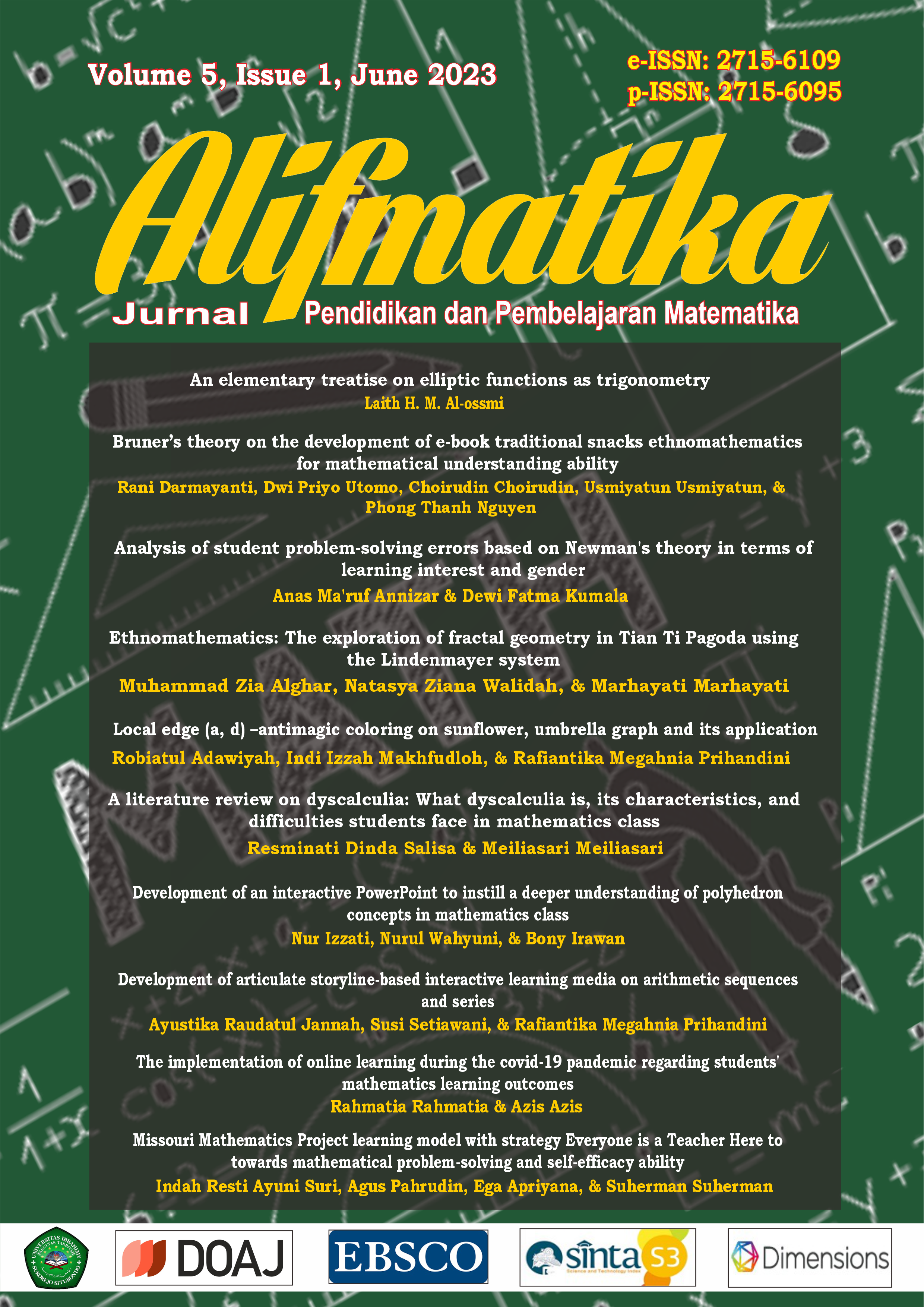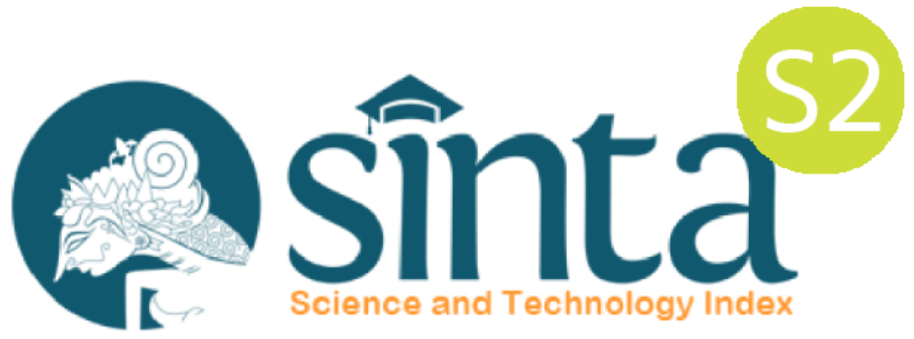Missouri Mathematics Project learning model with strategy Everyone is a Teacher Here to towards mathematical problem-solving and self-efficacy ability
DOI:
https://doi.org/10.35316/alifmatika.2023.v5i1.141-155Keywords:
Everyone is a Teacher Here, Learning Model, Mathematics, Missouri Mathematics Project, problem-solving, self-efficacyAbstract
Every student must acquire mathematical problem-solving skills and self-efficacy to assist them in the learning process and solve different mathematical problems. This study seeks to explore the impact of implementing “the Missouri Mathematics Project (MMP) learning model with the Everyone is a Teacher Here (ETH) strategy on the mathematical problem-solving skills and self-efficacy of learners”. This study employs a quasi-experimental design with a 2×2 factorial research scheme. In this research, tests of mathematical problem-solving skills and self-efficacy questionnaires were utilized to collect data. The method of data analysis employed the Normality test, the Homogeneity test, and the Multivariate Analysis of Variance (MANOVA) hypothesis tests. Based on the outcomes and MANOVA test calculations, it was determined that implementing the MMP learning model with the Everyone is a Teacher Here strategy affected students' mathematical problem-solving skills. The deployment of the MMP learning model with the Everyone is a Teacher Here strategy also affects students' self-efficacy. Implementing the MMP learning model with the Everyone is a Teacher Here strategy impacts learners' mathematical problem-solving skills and self-efficacy.
Downloads
References
Agustiana, E., Putra, F. G., & Farida, F. (2018). Penerapan model pembelajaran auditory, intellectually, repetition (AIR) dengan pendekatan lesson study terhadap kemampuan pemecahan masalah matematis peserta didik [Application of the auditory, intellectually, repetition (AIR) learning model with the lesson study approach to students' mathematical problem-solving abilities]. Desimal: Jurnal Matematika, 1(1), 1-6. https://doi.org/10.24042/djm.v1i1.1905
Akbar, P., Handayani, D., & Mirza, A. (2020). Peningkatan kemampuan pemecahan masalah matematik siswa kelas 12 pada materi dimensi tiga melalui pendekatan reciprocal teaching [Improving the mathematical problem-solving abilities of grade 12 students in three-dimensional material through a reciprocal teaching approach]. Jurnal Cendekia : Jurnal Pendidikan Matematika, 4(2), 900–913. https://doi.org/10.31004/cendekia.v4i2.330
Aldig, E., & Arseven, A. (2017). The contribution of learning outcomes for listening to creative thinking skills. Journal of Education and Learning, 6(3), 41-53. https://eric.ed.gov/?id=EJ1139260
Anggraini, R., Utami, C., & Wahyuni, R. (2020). Penerapan model pembelajaran Missouri Mathematics Project (MMP) untuk meningkatkan kemampuan pemahaman konsep matematis siswa pada materi segitiga [Application of the Missouri Mathematics Project (MMP) learning model to improve students' understanding of mathematical concepts in triangle material]. Journal of Educational Review and Research, 3(1), 65–70. https://doi.org/10.26737/jerr.v3i1.2065
Apriyanti, D. A. K., Sugiarta, I. M., & Suarsana, I. M. (2021). Pemahaman konsep matematika siswa dengan strategi everyone is a teacher here [Understanding students' mathematical concepts with the Everyone is a Teacher Here strategy]. Jurnal Analisa, 7(1), 13–22. https://doi.org/10.15575/ja.v7i1.8529
Astiswijaya, N. (2020). Meningkatkan kemampuan komunikasi matematis siswa dengan implementasi model pembelajaran Missouri Mathematics Project (MMP) [Improving students' mathematical communication skills by implementing the Missouri Mathematics Project (MMP) learning model]. Jurnal Pendidikan Matematika : Judika Education, 3(1), 8–16. https://doi.org/10.31539/judika.v3i1.1179
Casella, G., & Berger, R. L. (2002). Statistical Inference (2nd ed.). Duxbury.
Chairani, Z. (2016). Metakognisi siswa dalam pemecahan masalah matematika [Students' metacognition in solving mathematical problems]. Deepublish.
Desti, E., Anggoro, B. S., & Suherman. (2020). Pengaruh berpikir kreatif terhadap kemampuan memecahkan masalah matematika [The effect of creative thinking on the ability to solve mathematical problems]. Seminar Nasional Pendidikan Matematika UIN Raden Intan Lampung, 5(1), 526–532. http://www.ejournal.radenintan.ac.id/index.php/pspm/article/view/2504
Fauziah, R., Maya, R., & Fitrianna, A. Y. (2018). Hubungan self-confidence terhadap kemampuan pemecahan masalah matematis siswa SMP [The relationship between self-confidence and the mathematical problem solving abilities of junior high school students]. JPMI (Jurnal Pembelajaran Matematika Inovatif), 1(5), 881. https://doi.org/10.22460/jpmi.v1i5.p881-886
Firdaus, D. M., Purwanto, S. E., & Nuriadin, I. (2021). Contribution of self-efficacy and mathematics anxiety to students' mathematical reasoning abilities. International Journal of Progressive Mathematics Education, 1(2), 1–19. https://doi.org/10.22236/ijopme.v1i2.6488
Fitri, M. R., Anggoro, B. S., Leni, N., Sodiq, A., & Putra, R. W. Y. (2020). Hubungan kecerdasan majemuk dan motivasi belajar terhadap pemecahan masalah matematika [The relationship between multiple intelligences and learning motivation towards solving mathematical problems]. Seminar Nasional Pendidikan Matematika UIN Raden Intan Lampung, 5(1), 75–82. https://proceedings.radenintan.ac.id/index.php/pspm/article/view/73
Halidin, H. (2020). Pengaruh strategi pembelajaran Everyone is a Teacher Here terhadap hasil belajar matematika [The effect of Everyone is a Teacher Here learning strategy on mathematics learning outcomes]. AKSIOMA: Jurnal Program Studi Pendidikan Matematika, 9(2), 348–357. https://doi.org/10.24127/ajpm.v9i2.2764
Harini, R., & Rosyad, A. A. (2021). Husband support mediates the association between self-efficacy and cervical cancer screening among women in the rural area of indonesia. Asia-Pacific Journal of Oncology Nursing, 8(5), 560–564. https://doi.org/10.4103/apjon.apjon-2085
Huda, S., Suherman, Komarudin, Syazali, M., & Umam, R. (2020). The effectiveness of Al-Qurun Teaching Model (ATM) viewed from gender differences: the impact on mathematical problem-solving ability. Journal of Physics: Conference Series Series, 1467(1), 1–9. https://doi.org/10.1088/1742-6596/1467/1/012001
Indrawati, F. A., & Wardono. (2019). Pengaruh self efficacy terhadap kemampuan literasi matematika dan pembentukan kemampuan 4C [The effect of self-efficacy on mathematical literacy skills and the formation of 4C abilities]. Prisma, Prosiding Seminar Nasional Matematika, 2(1), 247–267. https://journal.unnes.ac.id/sju/index.php/prisma/article/view/29307
Janah, S. R., Suyitno, H., & Rosyida, I. (2019). Pentingnya literasi matematika dan berpikir kritis matematis dalam menghadapi abad ke-21 [The importance of mathematical literacy and mathematical critical thinking in facing the 21st century]. PRISMA, Prosiding Seminar Nasional Matematika, 2(1), 905–910. https://journal.unnes.ac.id/sju/index.php/prisma/article/view/29305
Jatisunda, M. G., & Nahdi, D. S. (2020). Kemampuan pemecahan masalah matematis melalui pembelajaran berbasis masalah dengan scaffolding [Mathematical problem solving ability through problem-based learning with scaffolding]. Jurnal Elemen, 6(2), 228–243. https://doi.org/10.29408/jel.v6i2.2042
Johanda, M., Karneli, Y., & Ardi, Z. (2019). Self-efficacy siswa dalam menyelesaikan tugas sekolah di SMP Negeri 1 Ampek Angkek [Students' self-efficacy in completing school assignments at SMP Negeri 1 Ampek Angkek]. Jurnal Neo Konseling, 1(1), 1-5. http://neo.ppj.unp.ac.id/index.php/neo/article/view/77
Komarudin, & Permana, P. T. (2019). LKPD berbasis scientific approach terhadap kemampuan pemecahan masalah peserta didik sekolah dasar [LKPD based on a scientific approach to the problem-solving abilities of elementary school students]. Terampil : Jurnal Pendidikan Dan Pembelajaran Dasar, 3(2), 79–91. https://doi.org/10.24042/terampil.v6i1.4385
Mariam, S., Nurmala, N., Nurdianti, D., Rustyani, N., Desi, A., & Hidayat, W. (2019). Analisis kemampuan pemecahan masalah matematis siswa mtsn dengan menggunakan metode Open Ended di Bandung Barat [Analysis of the mathematical problem-solving abilities of MTSN students using the Open Ended method in West Bandung]. Jurnal Cendekia : Jurnal Pendidikan Matematika, 3(1), 178–186. https://doi.org/10.31004/cendekia.v3i1.94
Meiliati, R., Muhammad Darwis, & Asdar. (2018). The effect of learning motivation, self-efficacy, and self-regulated learning on mathematics learning outcomes. Issues in Mathematics Education, 2(1), 83–91. https://doi.org/10.35580/imed9484
Mukuka, A., Mutarutinya, V., & Balimuttajjo, S. (2021). Mediating effect of self-efficacy on the relationship between instruction and students’ mathematical reasoning. Journal on Mathematics Education, 12(1), 73–92. https://doi.org/10.22342/JME.12.1.12508.73-92
Namaziandost, E., & Çakmak, F. (2020). An account of efl learners’ self-efficacy and gender in the flipped classroom model. Education and Information Technologies, 25(5), 4041–4055. https://doi.org/10.1007/s10639-020-10167-7
Noer, S. H., Gunowibowo, P., & Triana, M. (2020). Improving students’ reflective thinking skills and self-efficacy through scientific learning. Journal of Physics: Conference Series, 1581(1), 1–9. https://doi.org/10.1088/1742-6596/1581/1/012036
Novitasari, L. L. A., & Masriyah. (2020). Profil pemecahan masalah matematika kontekstual siswa smp ditinjau dari kepribadian Myer Briggs Indicator (MBTI) [Profile of contextual mathematics problem solving for junior high school students in terms of the personality of the Myer Briggs Indicator (MBTI)]. MATHEdunesa, 9(3), 631–646. https://doi.org/10.26740/mathedunesa.v9n3.p631-646
Puspita, L., Komarudin, K., & Astriani, M. (2020). Analysis of problem-solving skills: Impact of guided inquiry learning model based on Islamic values. JPBI (Jurnal Pendidikan Biologi Indonesia), 6(2), 347–354. https://doi.org/10.22219/jpbi.v6i2.11240
Putra, F. G., Widyawati, S., & Nabila, I. L. (2021). Pembelajaran problem based lerning (PBL) dengan nilai ke-islaman dan self-efficacy: Dampak dan interaksinya terhadap kemampuan berpikir kritis [Problem based learning (PBL) learning with Islamic values and self-efficacy: The impact and interaction on critical thinking skills]. JEMS (Jurnal Edukasi Matematika Dan Sains), 9(1), 67–77. https://doi.org/10.25273/jems.v9i1.8375
Rahmmatiya, R., & Miatun, A. (2020). Analisis kemampuan pemecahan masalah matematis ditinjau dari resiliensi matematis siswa SMP [Analysis of mathematical problem solving abilities in terms of the mathematical resilience of junior high school students]. Teorema: Teori Dan Riset Matematika, 5(2), 187–202. https://doi.org/10.31851/wahanadidaktika.v18i2.4387
Sari, M., Anggoro, B. S., & Sugiharta, I. (2020). Analisis peningkatkan kemampuan pemecahan masalah dan kemandirian belajar dampak flipped classroom berbantuan video pembelajaran [Analysis of increasing problem-solving abilities and independent learning the impact of flipped classrooms assisted by learning videos]. Nabla Dewantara: Jurnal Pendidikan Matematika, 5(2), 94–106. https://doi.org/10.51517/nd.v5i2.228
Sari, Y. A., Muhassin, M., Suri, I. R. A., & Putra, R. W. Y. (2020). Implementation of tapps type cooperative learning using gamification teaching materials on mathematical reasoning in terms of the confidence of Class VIII junior high school students. Journal of Mathematics Education and Science, 3(2), 61–67. https://doi.org/10.32665/james.v3i2.140
Suherman, S., Suharno, A. S., & Istihana, I. (2019). Alquran teaching model: the effect of problem-solving ability and gender on mathematics. HUMANISMA: Journal of Gender Studies, 3(1), 13–26. https://doi.org/10.30983/humanisme.v3i1.1078
Suherman, S., & Vidakovich, T. (2022). Tapis Patterns in the context of ethnomathematics to assess students’ creative thinking in mathematics: A rasch measurement. Mathematics Teaching Research Journal, 14(4), 56–72. publicatio.bibl.u-szeged.hu/26083/1/Suherman-TiborVidakovich_TapisPatternsintheContextofEthnomathematics.MTRJ1.pdf
Sunanto, R. F., Apriliani, R., & Nafi’ah, W. (2020). Students’ mathematical problem-solving abilities: the impact of the Co-Op Co-Op cooperative learning model and missouri mathematics project. Desimal: Jurnal Matematika, 3(3), 279–286. https://doi.org/10.24042/djm.v3i3.7332
Suri, I. R. A., Masykur, R., & Aji G., R. D. (2021). Analysis of mathematical connection ability: the impact of problem-solving-based Lasswell communication and Keirsey's personality. Journal of Mathematics Education and Science, 4(1), 7–14. https://doi.org/10.32665/james.v4i1.168
Tarumasely, Y. (2021). Pengaruh self-regulated learning dan self-efficacy terhadap prestasi akademik mahasiswa [The effect of self-regulated learning and self-efficacy on student academic achievement]. Jurnal Pendidikan Edutama, 8(1), 71–80. https://doi.org/10.30734/jpe.v8i1.1359
Ulva, M., & Suri, I. R. A. (2019). Pengaruh model pembelajaran auditory intellectualy repetition (air) terhadap kemampuan komunikasi matematis peserta didik [The effect of the auditory intellectual repetition (water) learning model on students' mathematical communication abilities]. Union: Jurnal Ilmiah Pendidikan Matematika, 7(1), 15–21. https://doi.org/10.30738/union.v6i3.3080
Utami, P. R., Noer, S. H., & Sutiarso, S. (2019). Pengembangan lembar kerja peserta didik dengan pembelajaran berbasis masalah ditinjau dari kemampuan komunikasi dan self efficacy. JPPM (Jurnal Penelitian dan Pembelajaran Matematika), 12(2), 300-316. http://doi.org/10.30870/jppm.v12i2.6221
Warsiki, A., & Mardiana, T. (2019). Pengaruh self-concept dan self-efficacy terhadap motivasi berprestasi mahasiswa jurusan manajemen berbasis KKNI [The effect of self-concept and self-efficacy on achievement motivation of students majoring in management based on KKNI]. Buletin Ekonomi, 2(2), 245–256. https://doi.org/10.31315/be.v17i2.5616
Yusuf, M. (2018). Peningkatan Keterampilan berpikir kritis dan hasil belajar siswa sd dengan menerapkan strategi Everyone is a Teacher here pada model pembelajaran kooperatif [Improving critical thinking skills and learning outcomes of primary school students by applying the Everyone is a Teacher here strategy to the cooperative learning model]. Jurnal Ilmiah Sekolah Dasar, 2(1), 18–30. https://doi.org/10.23887/jisd.v2i1.13706
Downloads
Published
How to Cite
Issue
Section
License
COPYRIGHT NOTICE
Author (s) who publish in Alifmatika: Jurnal Pendidikan dan Pembelajaran Matematika agree to the following terms:
- The Author (s) submitting a manuscript do so on the understanding that if accepted for publication, copyright of the article shall be assigned to Alifmatika: Jurnal Pendidikan dan Pembelajaran Matematika, Tarbiyah Faculty of Ibrahimy University as the publisher of the journal. Consecutively, author(s) still retain some rights to use and share their own published articles without written permission from Alifmatika: Jurnal Pendidikan dan Pembelajaran Matematika. This work is licensed under a Creative Commons Attribution-ShareAlike 4.0 International License.
- Copyright encompasses rights to publish and provide the manuscripts in all forms and media for the purpose of publication and dissemination, and the authority to enforce the rights in the manuscript, for example in the case of plagiarism or in copyright infringement.
- Alifmatika: Jurnal Pendidikan dan Pembelajaran Matematika and the Editors make every effort to ensure that no wrong or misleading data, opinions or statements be published in the journal. In any way, the contents of the articles and advertisements published in Alifmatika: Jurnal Pendidikan dan Pembelajaran Matematika are the sole responsibility of their respective authors and advertisers.
- The Copyright Transfer Form can be downloaded here [Copyright Transfer Form Alifmatika]. The copyright form should be signed originally and send to the Editorial Office in the form of original mail, scanned document to alifmatika[at]ibrahimy.ac.id or upload the scanned document in the comments column when sending the manuscript.























_by_Matematohir.jpg)






